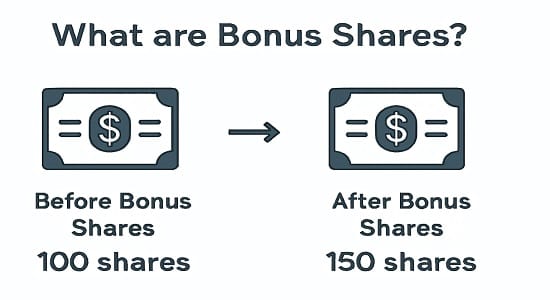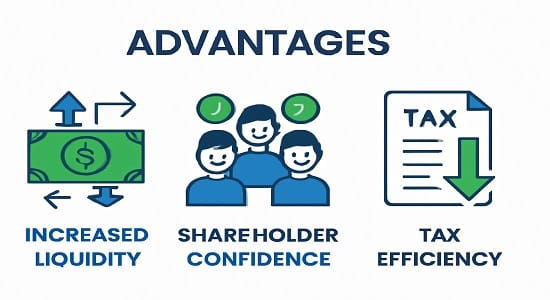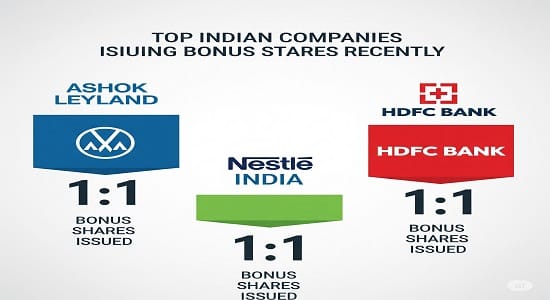Bonus Shares Meaning and Benefits: Complete Guide for Investors
Shareholders tend to get thrilled when they hear that a company has announced bonus shares. But what does it entail? Are the bonus shares actually a profit for the shareholders or merely a method of dividing the existing value?
In this blog, we’ll demystify all you need to know about bonus shares – ranging from their definition, process and effect, to the advantages and limitations. Whether you are a novice or seasoned investor, this primer will educate you on why businesses issue bonus shares and how it impacts your portfolio

What are Bonus Shares
Bonus shares are extra shares distributed among existing shareholders without any cost, depending on the number of shares they already possess. A company distributes these shares when it has reserves or profits, but rather than issuing a cash dividend, it rewards the investors by expanding their shareholding.
Example: If a company announces a 1:1 bonus issue, you will receive 1 extra share for every 1 share you already own.
Why Do Companies Issue Bonus Shares?
Companies give bonus shares for a variety of reasons:
- To reward shareholders without cash payment.
- To enhance the liquidity of shares (more shares for sale).
- To make the share price come down into reach for retail investors.
- To send a signal of financial health and optimism regarding future growth.
Types of Bonus Issues
| Bonus Ratio | Meaning | Examples |
| 1:1 | 1 share for every 1 share held | 100 shares → 200 shares |
| 2:1 | 2 shares for every 1 share held | 100 shares → 300 shares |
| 3:2 | 3 shares for every 2 shares held | 200 shares → 500 shares |
The total value of your investment remains the same immediately after the bonus issue; only the number of shares increases, and the price adjusts proportionally.

Impact of Bonus Shares on Shareholders

Benefits:
- No Extra Cost: Shareholders receive additional shares without paying anything.
- Greater Liquidity: Additional shares in the market enhance market activity.
- Long-Term Rewards: When the company is doing well, bonus shares appreciate over a period of time.
- Positive Indication: Signals confidence of company in future profits.
Drawbacks:
- No Cash Benefit: You don’t get direct cash unlike dividends.
- Price Adjustment: The price of the share decreases after bonus issue proportionately to the ratio.
- Tax Implications: Although bonus shares are not paid for, they might be subject to capital gains tax when sold later.
Example: Bonus Share Calculation
Let’s say you own 100 shares of ABC Ltd. priced at ₹1,000 each.
| Before Bonus (1:1) | After Bonus (1:1) |
| Shares = 100 | Shares = 200 |
| Price per Share = ₹1,000 | Price per Share = ₹500 |
| Total Value = ₹1,00,000 | Total Value = ₹1,00,000 |
As you can see, the total investment value remains the same initially. But over time, if the company grows, the value of your 200 shares can increase significantly
Recent Bonus Share Announcements in India (2025)
| Company | Bonus Ratio | Announcement Date |
| Nestle India | 1:1 | July 2025 |
| HDFC Bank | 1:1 | February 2025 |
| Ashok Leyland | 1:1 | July 2025 |

Should You Invest in Bonus Share Companies?
Investing in the firms that give bonus shares can be tempting, but the idea should not be formed on the basis of the bonus. Always verify:
- Company Fundamentals (Revenue, Profitability, Debt level)
- Growth Potential (Industry prospects, expansion plans)
- Dividend History (Cash benefits apart from bonus issues)
(A bonus issue is a good sign, but it’s not a guarantee of higher profits. Combine it with fundamental analysis before making investment decisions.)
Key Takeaways:
- Bonus shares are free of cost additional shares given to current shareholders.
- They enhance liquidity and investor confidence but don’t boost immediate wealth.
- Share prices are adjusted after the issue, maintaining the aggregate investment value constant.
- In the long run, bonus shares can raise wealth if the firm expands.
- Always take into account fundamentals prior to investing.
Conclusion:
Bonus shares are an incentive mechanism for long-term shareholders. They don’t make you rich overnight but boost long-term returns if the company keeps growing. For retail investors, bonus issues also render stocks cheaper, making the market more participation-friendly.
So, the next time you hear about bonus share announcements, don’t be carried away by the excitement—research the company beforehand, and then make an investment call.


I got good info from your blog
An fascinating discussion is price comment. I believe that you need to write more on this subject, it might not be a taboo topic however generally persons are not enough to speak on such topics. To the next. Cheers
I couldn’t resist commenting
I like this post, enjoyed this one thanks for posting.
Some truly interesting info , well written and broadly user friendly.